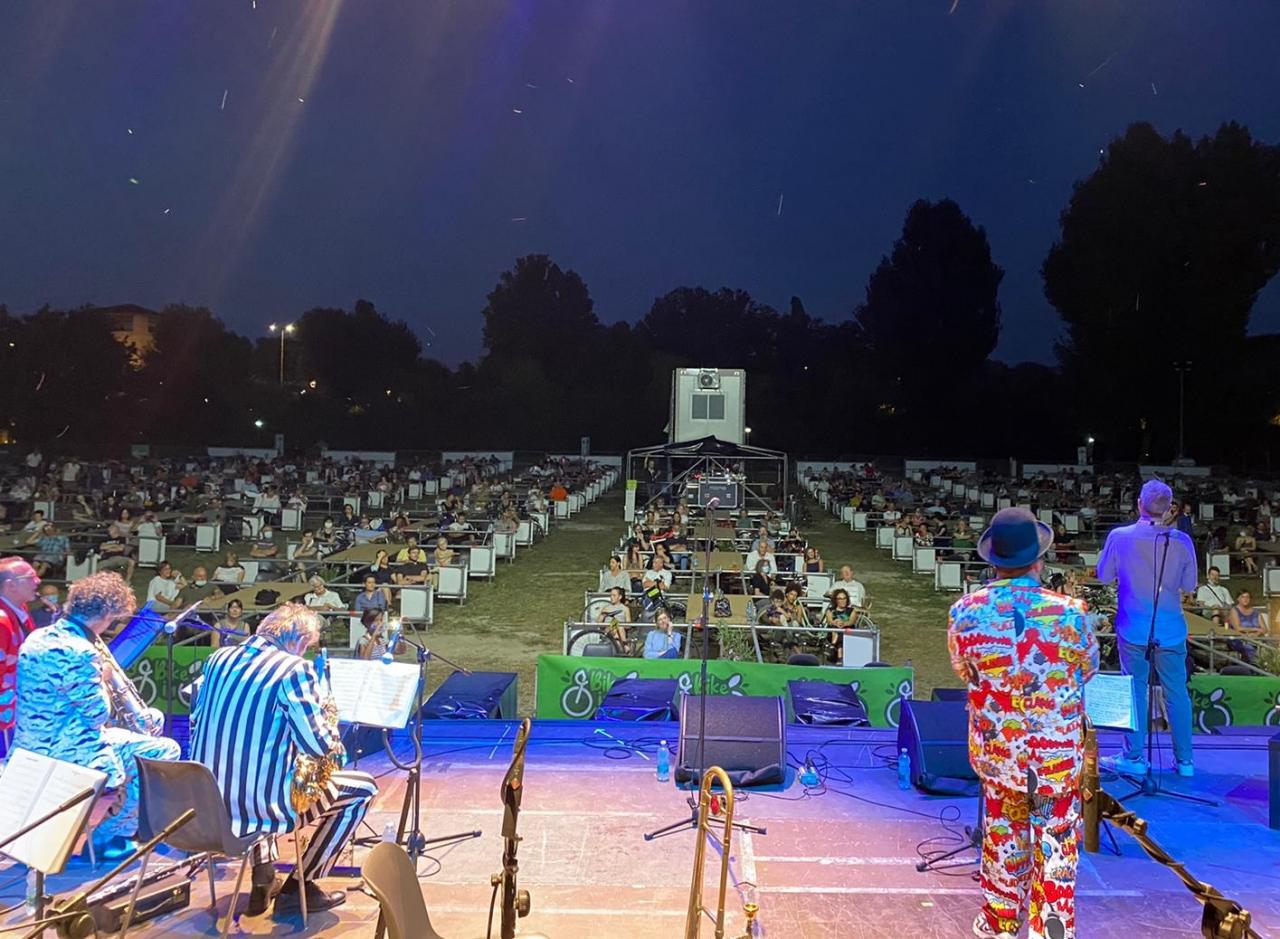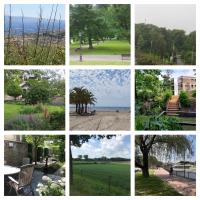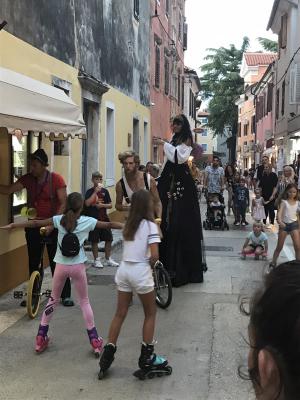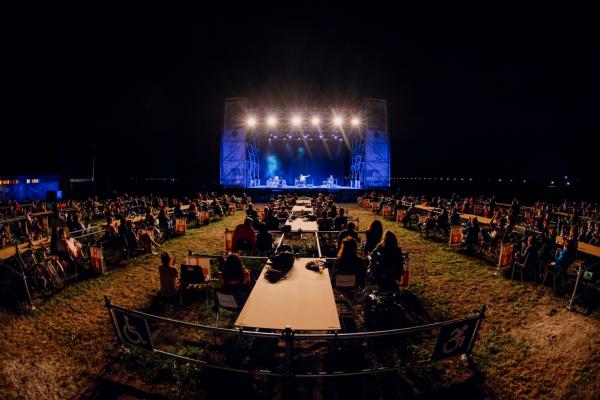
URBACT cities are promoting health, wellbeing and community connections as coronavirus spikes again.
As Europe faces a second wave of Covid-19, towns and cities are looking for ways to encourage people of all ages to stay healthy, happy and connected – an increasingly tough challenge with winter approaching, budgets dwindling and ‘coronavirus fatigue’ creeping in.
Thanks to URBACT networking, the value of outdoor and cultural activities, and simply ‘play’ as a tool within communities under varying degrees of lockdown, has received some timely attention in several of Europe’s smaller cities. In this article, we explore what inspiration we can take from ideas that have been tried so far in some small-but-resourceful URBACT towns and cities.
But first… why talk about play during a crisis?
For Ileana Toscano, Lead Expert of the URBACT Playful Paradigm network, play is a fundamental part of a healthy life, all the more important during the coronavirus pandemic: “For individuals, families, the elderly, working people, we all get so stressed and anxious, but it’s important to have a break, spend quality moments together!”
“I think that the philosophy to promote play is to promote better relationships between people,” says Toscano. “Playing can foster much better participation in civic life, but above all it helps us forget our problems for a moment.”
We all know that measures are needed to address people’s physical needs during the pandemic, particularly to protect their health and incomes. But cities also have other ‘softer’ tools at their disposal to support their communities in other ways. So, when Europe’s first Covid-19 lockdowns started, Playful Paradigm’s international network of cities reacted immediately, sharing practical advice for supporting mental wellbeing in their communities and developing together an online collection of practical play tools for local residents in their own languages.

The Playful Paradigm network put together an online collection of practical play tools for local residents in the languages of the network’s cities.
“We’re grateful to Playful Paradigm for inspiring us to think about the community and how to try to make them relax in a totally new and scary situation,” said Corinne Pozzecco, City Project officer for Novigrad-Cittanova. “We learned that play is a useful tool and can be used not only in the classical way to entertain children but even for adults to learn, relax and connect.”
In a context where many are warning of the mental health risks associated with Covid-19, one of the many roles that cities can play is in supporting their communities to find safe and healthy ways to enjoy time together.
Broadening our sense of play
Related topics have also arisen in URBACT networks beyond Playful Paradigm. For example, in the C-Change network, towns and cities have been exploring the arts and culture as community tools, which also proved relevant as part of discussions on local Covid responses involving community activities and play. (See example from Mantua (IT) below.)
The URBACT Health&Greenspace network is exploring how to improve urban greenspaces to promote mental and physical health for local communities. It recently highlighted that under Covid impacts and stay-at-home measures “citizens became more aware than ever about the need for equal access to greenspaces and their enormous value regarding physical and mental health. It is not a coincidence that one of our partner cities, Breda registered more than 100 interested participants to its July 1st ULG meeting.”

The Health&Greenspace network works to improve urban greenspaces, a great asset to local communities’ mental and physical health, especially during Covid-19 lockdowns.
Meanwhile, the URBACT Healthy Cities network is similarly continuing to promote the value of outdoor activities and accessible green spaces. In a recent article, it highlighted how the pandemic had reinforced the urgency of these issues for their communities and how ongoing exchanges between partner cities had focused on measures “to help people stay fit and active while following social distancing regulations”.
What specific ideas can we take from URBACT towns and cities?
Fom Cork (IE) where a cross-sectoral ‘Let’s Play Cork’ initiative enticed families out to play, to Viana do Castelo (PT) whose Teatro do Noroeste - Centro Dramático de Viana was the first national company to broadcast live theatre to 100 000 online spectators, URBACT cities across the EU have found practical solutions for promoting social inclusion and wellbeing through play and the arts as part of their broad Covid-19 response so far. Here, for inspiration, are three examples.
1. Novigrad-Cittanova, Croatia (population 4 345)
Novigrad is a tourist and fishing town on the Adriatic coast and a partner city of Playful Paradigm. During their March and April 2020 lockdown, while banners around the town promoted the slogan “I'mstayinghome” in Croatian and Italian (#ostajemdoma and #iorestoacasa), the City and local library websites shared tips for playing at home – with board games and activities using everyday objects.
In the summer, a socially-distanced cultural programme kept tourists and locals entertained while keeping crowds dispersed. ‘Music on every corner’, featured local bands in twice-weekly concerts around parks, squares and streets from June till September 2020. Another event was already Covid-adapted. Stretching from the main square to the port, the annual ‘Street Wizards Evening’ for all ages combined music, dancing, juggling, acrobatics and other circus skills. “Every corner came alive!” says City Project officer Corinne Pozzecco.

Every corner in Novigrad-Cittanova, Croatia, came alive with music and Covid-adapted events between July and September 2020.
Meanwhile, certain educational activities were moved outside. One that the City of Novigrad had originally planned indoors with the nearby Buie Center for inclusion, in collaboration with environment experts, became a workshop collecting plastic from the beach and turning it into art.
Corinne Pozzecco had been very worried. She was conscious that “being a small city, one bad decision could jeopardise all the community.” But there were also reasons to be thankful. “As a small community we’re very harmonious and connected, so the level of discipline during the lockdown was extremely high.” In the end, though the sector did suffer, tourism was higher than expected in July and August, reaching 50% of 2019 figures.
2. Esplugues de Llobregat, Spain (population 46 000)
This city lies within the Barcelona Metropolitan area and is another partner city of Playful Paradigm. “During the Covid restrictions, we wanted to keep people motivated and also show that culture, activities with games, art, music… are very good to help people be OK,” says the URBACT Local Group (ULG) coordinator Guadalupe Penas.
Esplugues knew that it had to address the urgent physical needs of its citizens. It launched a Covid-19 reconstruction plan with 1 million euros for families and businesses and provided extra help for schools and vulnerable people, including food delivery and help with online access, mobilising 300 volunteers.
But, as Guadalupe Penas points out: “The city technicians also worried a lot about psychological health… There was a big worry about isolation for elderly people, troubles for parents balancing work with children indoors…” This required a range of responses.
As well as targeted psychological support to vulnerable people, the city organised diverse social activities, including a ‘play at home’ campaign with online activities for families, children, young adults and the elderly. Each week there were new virtual games, board games, game creation tips – such as a personalised ‘Guess Who?’ with family members – and more.
Thanks to the URBACT Local Group (ULG), the city worked closely with the local hospital and 15 associations including afterschool clubs, a Spanish and Catalan language centre and an organisation for people with disabilities. Their actions included a week of activities online and out in the parks, to coincide with the ‘International day of play’, with live cooking, yoga lessons for children, and movement games for elderly people. And when Covid restrictions were lifted on the last day, the local Red Cross proposed a photo-rally around interesting points in the city.
Cultural events brought the area’s “everything will be OK” slogan alive. While local museums shared content and activities, Esplugues joined neighbouring towns in producing an online cultural festival in May 2020 with local musicians, poets and other artists.
3. Mantua, Italy (population 50 000)
Mantua (Mantova in Italian) is a small city in Lombardy, northern Italy and partner in the URBACT C-Change network. It has found creative, healthy ways to boost cultural tourism, promote social inclusion, and keep children playing.
With the whole town centre classified as a UNESCO World Heritage site, the cultural tourism that keeps the local economy afloat has been “very, very badly affected by the Covid emergency”, says Mantua’s Deputy Mayor Adriana Nepote. The Covid response plan included actions to help save businesses and jobs, such as cutting taxes for the use of public space.
But the response also emphasised social and cultural support, taking into account the reality set out by Adriana Nepote: “Small cities not having much money, we have really needed to think and find innovative solutions that are not that expensive…” Here are two examples of such solutions… Volunteers were connected with older residents. Unemployed people were recruited to disinfect outdoor play areas so they could be kept open for children.
A cultural programme of twice-weekly open-air concerts, shows and films, dubbed ‘Bike-In’ was also organised in a lake-side setting only accessible by bicycle – attracting an estimated 5 000 people over the course of the summer. And, thanks to connections in the URBACT local group, associations provided new outdoor activities for children, such as investigating how to repair a bicycle, or exploring the city.

Twice-weekly open-air concerts, shows and films, dubbed ‘Bike-In’, attracted around 5 000 people over the summer in Mantua, Italy.
Nepote concludes, “I think this terrible period gave a very good sense of community and people tried to help. In Mantova the people were feeling: we’ll all work together to get through this!”
Further information
Interested in more ideas for cultural and play-based activities, both outdoors and indoors? Check out some of the following resources:
A Collection of useful Covid-19 resources from the Playful Paradigm network cities
The Playful Paradigm Toolkit to Promote Playful Activities in Schools
Free guided physical activity sessions from Vic (ES) – Healthy Cities
An online sports training plan and virtual sessions to help the population to be active and healthy at home from Loulé (PT) – Healthy Cities
Know of any more? Share them with us on Twitter @URBACT or by writing to e.thorpe@urbact.eu.
The eight partner cities of the Playful Paradigm network are already investigating new approaches to encourage community activity and play for the next wave of Covid-related restrictions. So, keep checking their network page for updates, as well as those of C-Change, HealthyCities, Health&Greenspace and more…

